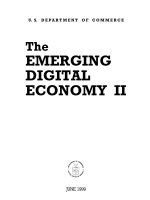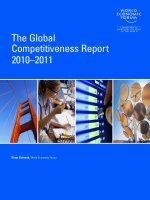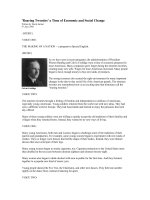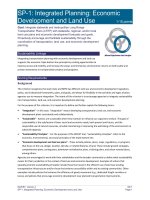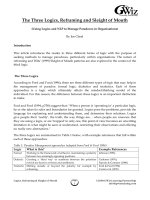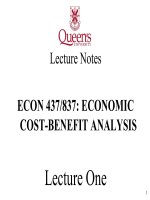Reframing economic ethics
Bạn đang xem bản rút gọn của tài liệu. Xem và tải ngay bản đầy đủ của tài liệu tại đây (1.86 MB, 137 trang )
HUMANISM IN BUSINESS
SERIES
Series Editor: The Humanistic
Management Network
REFRAMING
ECONOMIC ETHICS
The Philosophical
Foundations of
Humanistic
Management
Claus Dierksmeier
Humanism in Business Series
Series Editor
The Humanistic Management Network
Aim of the Series
The Humanistic Management Network is an international, interdisciplinary, and independent network that promotes the development of an
economic system with respect for human dignity and well-being. The
Humanistic Management Network defends human dignity in face of its
vulnerability. The dignity of the human being lies in its capacity to define
autonomously the purpose of its existence. Since human autonomy realizes itself through social cooperation, economic relations and business
activities can either foster or obstruct human life and well-being. Against
the widespread objectification of human subjects into human resources,
against the common instrumentalization of human beings into human
capital and a mere means for profit, we uphold humanity as the ultimate
end and principle of all economic activity. In business as well as in society,
respect for human dignity demands respect for human freedom. Collective
decision-making, in corporations just as in governments, should hence be
based on free and equal deliberation, participation or representation of all
affected parties. Concerns of legitimacy must, in economics like in politics, precede questions of expediency. We believe that market economies
hold substantial potential for human development in general. To promote
life-conducive market activities, we want to complement the quantitative
metrics which hitherto define managerial and economic success with qualitative evaluation criteria that focus on the human dignity of every woman
and every man. As researchers, we work towards a humanistic paradigm
for business and economics, trying to identify and facilitate corporate and
governmental efforts for the common good. As a think-tank, we set out
to spread intellectual tools for culturally and ecologically sustainable business practices that have the human being as their focal point. As teachers, we strive to educate, emancipate and enable students to contribute
actively to a life-conducive economy in which human dignity is universally respected. As practitioners, we act towards the implementation of a
humanistic economy on an individual, corporate, and governmental level.
As citizens, we engage our communities in discourse about the benefits of
a human-centred economy.
More information about this series at
/>
Claus Dierksmeier
Reframing Economic
Ethics
The Philosophical Foundations of Humanistic
Management
Claus Dierksmeier
Weltethos-Institut
University of Tübingen
Baden-Württemberg, Germany
Humanism in Business Series
ISBN 978-3-319-32299-5
ISBN 978-3-319-32300-8
DOI 10.1007/978-3-319-32300-8
(eBook)
Library of Congress Control Number: 2016946182
© The Editor(s) (if applicable) and the Author(s) 2016
This work is subject to copyright. All rights are solely and exclusively licensed by the
Publisher, whether the whole or part of the material is concerned, specifically the rights of
translation, reprinting, reuse of illustrations, recitation, broadcasting, reproduction on
microfilms or in any other physical way, and transmission or information storage and retrieval,
electronic adaptation, computer software, or by similar or dissimilar methodology now
known or hereafter developed.
The use of general descriptive names, registered names, trademarks, service marks, etc. in this
publication does not imply, even in the absence of a specific statement, that such names are
exempt from the relevant protective laws and regulations and therefore free for general use.
The publisher, the authors and the editors are safe to assume that the advice and information
in this book are believed to be true and accurate at the date of publication. Neither the publisher nor the authors or the editors give a warranty, express or implied, with respect to the
material contained herein or for any errors or omissions that may have been made.
Cover illustration: Modern building window © saulgranda/Getty
Printed on acid-free paper
This Palgrave Macmillan imprint is published by Springer Nature
The registered company is Springer International Publishing AG Switzerland
To all the students worldwide fighting for a curriculum change in
economics and management studies.
ACKNOWLEDGMENTS
Many colleagues and friends enriched the ideas presented here. I am very
grateful to all friends and colleagues who, through their critical readings,
did much to improve the text, especially to Laura Dierksmeier, Simon
Walch, and Jonathan Keir, and, most of all, to Adrian von Jagow, who in
addition to giving me valuable feedback also took care of producing the
index and the bibliography.
Also, I thank my previous coauthors, namely Anthony Celano, Matthias
Hühn, and Michael Pirson, who were so kind as to allow me to borrow
freely from our papers. The chapters of this book often restate arguments
made elsewhere in more academic detail. In particular, I draw on the following texts:
– Dierksmeier, Claus. 2015. Human dignity and the business of
business. Human Systems Management 34: 33–42.
– Hühn, Matthias, and Claus Dierksmeier. 2014. Will the real
A. Smith please stand up!. Journal of Business Ethics 12: 119–132
– Dierksmeier, Claus. 2013. Kant on virtue. Journal of Business
Ethics 113(4): 597–609.
– Dierksmeier, Claus, and Anthony Celano. 2012. Thomas Aquinas
on justice as a global virtue in business. Business Ethics Quarterly –
Special Issue on Virtue Ethics 22(2): 247–272.
– Dierksmeier, Claus. 2011. The freedom-responsibility nexus in
management philosophy and business ethics. Journal of Business
Ethics 101: 263–283.
vii
viii
ACKNOWLEDGMENTS
– Dierksmeier, Claus, and Michael Pirson. 2010. The modern corporation and the idea of freedom. Philosophy & Management 9(3):
5–25.
– Dierksmeier, Claus and Michael Pirson. 2009. Oikonomia versus Chrematistike. Aristotle on wealth and well-being. Journal of
Business Ethics 88(3): 417–430.
And a big thank you goes out to Liz Barlow and Maddie Holder at
Palgrave Macmillan, for encouraging me to write this book and navigating
me through the editorial process.
CONTENTS
1 Introduction
1
2
The
2.1
2.2
2.3
2.4
Mechanistic Paradigm
The Road to “Value-Free” Economics
From Theoretical to Practical Realizations
Rigor or Relevance?
Lessons Learned
11
12
18
23
28
3
The
3.1
3.2
3.3
3.4
Teleological Paradigm
Aristotle against Excess
Aquinas on Justice
Adam Smith on Sympathy
Lessons Learned
35
36
44
53
59
4
The
4.1
4.2
4.3
4.4
Liberal Paradigm
Kant as a Bridge-Builder
Quantitative Versus Qualitative Freedom
Applications to Management
Lessons Learned
67
70
76
87
94
ix
x
CONTENTS
5 Toward a Humanistic Paradigm?
5.1 From Premodern to Modern Conceptions of Dignity
5.2 Unity and Difference: A Global Ethic?
5.3 Applications to Business
5.4 Lessons Learned
103
104
109
113
117
6 Outlook
121
Index
125
CHAPTER 1
Introduction
Abstract Recent economic crises have further fueled the debate over the
social impact of economics and management education (Krugman 2009;
Shiller 2010; Ötsch und Kapeller 2010). Former fixtures of the conventional wisdom of the economics discipline—such as the macroeconomic
quest for ever more growth and the microeconomic pursuit of profit—are
now held responsible for many social, ecological, and moral failings of the
present economic system (Pirson and Steinvorth 2014). Behind this critique and propelled by it, a deeper shift in economic thought is arguably
happening. After about 200 years of imitating the methods of the natural
sciences and their positivistic approach, and after decades of relegating
any and all normative considerations to the margins of business theory,
a paradigm shift appears possible in the direction of a more realistic and
thus more relevant framework for economics, i.e. humanistic management
(Amann 2011).
Keywords Humanistic Management • Business Ethics • Economics •
Economic Ethics • Philosophy
© The Editor(s) (if applicable) and the Author(s) 2016
C. Dierksmeier, Reframing Economic Ethics, Humanism in Business
Series, DOI 10.1007/978-3-319-32300-8_1
1
2
C. DIERKSMEIER
In order to understand the public discontent with professional
economics and the notable search for alternatives to or within the neoclassical framework—“new economic thinking,” “postautistic economics,” “heterodox economics,” “pluralist economics,” to name but a few
of the most prevalent movements—we need to dwell on the relationship between business practice and management education. At present,
business schools are being blamed for having equipped students with a
worldview that makes them skeptical at best and hostile at worst toward a
morally responsible and environmentally sustainable conduct of business
(Gioia 2002, 2003; Goshal 2003, 2005; Elegido 2009). In the recent
past, the very ethics that our economic system de facto relies upon has
been taught merely alongside—often at the very margins of—the standard offerings in business and economics (Matten and Moon 2004).
This setup is more than unfortunate, as it confronts students with two
wholly contrary approaches to the business world: freedom versus necessity (Dierksmeier 2009).
In traditional classes, students are being instructed along the lines
of the neoclassical economics, that is, within a paradigm that prescribes profit-maximization in such a manner as to offer little-tono leeway for alternatively oriented decision-making, for example,
in favor of morals. Iron laws of structural necessity— students are
being told—rule the economy to the effect that the market dictates
managerial behavior. In their business ethics classes and in courses
on sustainability or humanistic management, however, students then
encounter, as a no-less fundamental but obverse premise, the doctrine
of human freedom, now being introduced as the indispensable foundation of any and all managerial responsibility. In unmediated confrontation, these contrary viewpoints lead to a schizophrenic worldview
(Dierksmeier 2011a).
Students often resolve this cognitive double bind in a turn against
ethics (Hühn 2014). Against moral theories they object, for instance,
the “dog-eat-dog” reality of business would not allow for any or
much decent behavior. Practitioners in their majority, however, value
investments in Corporate Social Responsibility (CSR) and sustainability programs as not only reducing costs (building reputation, avoiding litigation, etc.) but also as generating otherwise precluded profits
(through the quest for novel channels of productivity and innovation
as well as through access to more goodwill on the part of employees
INTRODUCTION
3
and customers). And they express this view the stronger, the more and
the longer they have garnered practical experience with sustainability
programs, as a study of more than 1400 CEOs worldwide by The
Boston Consulting Group documented (BCG 2009). So, when students dismiss the feasibility of ethically responsible management, they
react apparently less to the reality of business than to its portrayal
in economic textbooks. Consequently, when—as ever more studies
show—graduates leave business schools with weaker ethical standards
than they had upon entry (for a good survey see Elegido 2009), it
shows that management education does indeed have a marked impact
on students, albeit a negative one (Net Impact 2007a, b, 2008).
This is the regrettable outcome of a pedagogy which undermines the
very premises upon which ethical and humanistic management rests
(Pfeffer 2005).
This dismal situation will persist as long as management education fails
to engage in deeper-reaching reflections on the true nature of economic
theory and practice. As discussion in management theory and in business ethics is both framed and influenced by the teachings of economics,
we need to investigate how the conceptual basis for any form of corporate responsibility, that is, managerial freedom, is described in economic
theory (Dierksmeier 2011a). In economics, however, managerial freedom
often tends to be neglected (as inessential and powerless against market
forces) or depreciated (as a source of deviations from rational efficiency
rules). Exceptions to this trend, such as the works of Amartya Sen, still
prove the rule (Sen 2002). The same can be said, a few exceptions apart
(Drascek and Maticic 2008), for management literature. As long as this
state of affairs persists, the very premises of all corporate responsibility
remain in question and, consequently, corporate investments in business
ethics are bound to appear to students as futile: as naïve efforts at best and
as an irresponsible waste of corporate resources at worst (Friedman 1970;
Jensen 2002).
In order to change this situation, we have to unearth the foundations
for moral action within economic theory, making ourselves aware of
how past philosophical positions and methodological assumptions
(namely epistemological materialism and quantitative reductionism)
have framed the economic mind such that the dimension of moral
freedom and responsibility was all but obliterated. Especially, we have
to examine how and why economic theory began construing human
4
C. DIERKSMEIER
agency within the narrow confines of the homo economicus-model,
devising the corporation as a mechanistic clockwork in a freedomaverse pursuit of profits. Against these traditions and through a deconstruction of their axioms, the real leeway of managerial discretion and
the immanent responsibilities of corporate decision-making deserve to
be emphasized (Brodbeck 2000).
Over the last years, ever more economists have begun to inch away from
the long cherished homo economicus-model and from management models
that directly rely on it, such as principal/agent-theory, which, incidentally, has
been given up by its very author, Michael Jensen (Erhard and Jensen 2011,
2014). Against former depictions of human behavior as merely a rational
pursuit of utility-maximization, more and more economists—especially institutional economists, behavioral economists, and neuro-economists—and a
host of management scholars today advocate for a broader set of objectives,
including normative ones, and vie to present their theories as amenable to
demands for social, ecological, and moral sustainability. Eventually, it stands
to argue, economics as a whole might cut itself loose from its old positivist
moorings (Walsh 2003). We are observing, in short, a return of ethics to
economics (Hausman and McPherson 1993; Dutt and Wilber 2010).
There is much to be said in favor of these developments. Economic
action, after all, stems from human agents acting from human concerns. And descriptions of economic behavior match reality only when
being observant of the moral prescriptions that inform such behavior at
the individual level (Dierksmeier 2011a). As economists have also long
since admitted, the subjects that drive the economy are not animated
maximization-algorithms but beings in deep and manifold relations with
their sociocultural contexts (Veblen 1898; Pigou 1962). And these contexts, surely, are replete with moral meaning. It is high time, therefore,
that the ethical dimension of economic life also be reflected in the research
agenda, theory, and pedagogics of economics and business studies.
Why indeed would economics, as a discipline dealing with human behavior, prefer to work with models emulating the study of inanimate objects?
Why not rather orient its methods toward interpreting the lively interactions
of free subjects? Recent advances in behavioral economics, empirical game
theory, and neuro-economics as well as in various fields of psychological
and sociological research on economic agency suggest that economics does
indeed need a new anthropology (Etzioni 2010; Chibnik 2011; Fehr and
Rangel 2011; Glimcher and Fehr 2013). In order to cease being the proverbial “dismal discipline,” economics should pay heed also to the findings
INTRODUCTION
5
of the social sciences and the humanities (Melé and Dierksmeier 2012). The
mechanistic anthropology of neoclassical economics will arguably have to
yield to a renewed concern for the interconnected dimensions of human life
in relation with nature, society, and culture. Economists cannot on one hand
emphasize the uncertainty or the fluidity of human knowledge, while on the
other shielding their discipline from the historicity and culture-dependency
of human existence that are the origin of those vicissitudes. A richer, more
contextualized depiction of economic agency is necessary because only realism brings relevance and enables responsibility (Dierksmeier 2011a).
In this book, I draw as a conclusion from these observations that since values and virtues are not marginal to economic practice, they no longer ought
to be relegated to the role of mere side constraints to the logic of maximization in economic theory. Instead, I contend, ethics proffers an important orientation for questions of economic strategy. Indeed, for most of the recorded
history of economic thought, economic theory at least was inspired and
organized by ethical orientations, which provided an overarching purpose
and thus an overarching conceptual unity for the variegated normative goals
of business and economy (Bonar 1893; Alvey 1999). I hold that in order to
capture human economic agency adequately we must concentrate and elaborate on that inherent normativity of economic thinking (Sen 2002).
Reflections on human nature and values have been at the forefront of
economic thinking for more than 2000 years, from ancient times up to
the late eighteenth century. From “stone age economics” (Sahlins 1972)
via Plato and Aristotle to Adam Smith, that is, for about several thousand
years, economic thinking was firmly linked to metaphysical, theological,
and moral reflections. The Greek philosophers treated economics as part
and parcel of their overall reflections on the common good of the polis. The
theologians of the Middle Ages likewise subordinated economic questions
to their discourses about the good and pious life, and still the philosophers
of the Enlightenment pursued economics with an overall perspective to
the emancipation of the human being from constraints (Bonar 1893).
Nota bene, this includes economic heroes of the time such as Adam Smith
(1723–1790), who, holding a chair for moral philosophy, penned a voluminous Theory of Moral Sentiments (1759), long before he investigated the
reasons for The Wealth of Nations (1776). Although after Smith economic
philosophy (then conducted mostly under the name of national or political economy) emancipated itself from theology, it remained oriented at the
ideal of the common good (see Sect. 3.3). While the discipline narrowed
its focus down to the concrete legal and cultural embedding of a given
6
C. DIERKSMEIER
economy, rather than pondering in the abstract about its philosophical
essence and purpose, economists continued to see the overall welfare of a
given people or nation as the supreme goal of their discipline. In fact, only
because of a broadly shared consensus among economists that the goals
of the economy were legitimately defined by a national political system—
hence the term “national economics” in fashion from roughly the 1750s
on—did economists find it appropriate to concentrate on the more technical questions of their discipline such as the reduction of scarcity.
Today, in search of orientation for contemporary efforts to reconcile
economic with social and ecological sustainability, we ought to reappropriate this wisdom of the ages. My book wants to contribute to that effort.
Whereas typically reformist agendas in economics and management education are focused on the present and its pressing needs, I am courting the
insights of the past. I hold that while we must be informed by the present,
we ought not be beholden to its perspectives. A too adamant attachment to
current viewpoints keeps us glued to the very paradigms that led us into the
crisis. Colloquially put, in order to “think outside the box,” we first need to
recognize the very “box” we are trapped in. Hence we need to observe the
initial construction of the “box,” that is, we ought to trace the historical steps
that led up to the current (mechanistic) paradigm of business in order to see
where it went wrong and how we can escape it (Dierksmeier 2011a). Hence
this book traces the history of economic ideas—from Aristotle through
Smith and Kant up to the present day—in a critical reconstruction. By helping readers realize what (and how much) of the current economic worldview
is socially construed, the text prepares for its thoroughgoing reform through
“humanistic management” (for an introduction see Spitzeck et al. 2009).
In all, this essay aims to accomplish four goals. First, the reader will see
that ethics is not an outward imposition on the economy and economics but
rather a building block of their sustained success. Second, one will come to
understand the differences between the major ethical schools of thought that
still contend with one another today. Third, a synthesis of these schools that
combines their respective strengths shall be presented. Fourth, the readers
will be prepared conceptually to participate in current discussions around
humanistic management and a humanistic reform of business education.
All four parts of this essay rely on as well as defend one major thesis: I
argue that neglect of the idea of freedom in economics in recent decades
has led to an inadequate conceptualization of the ethical responsibilities
of corporations within management theory. Theories of business ethics
and corporate responsibility, I hold, are fundamentally dependent upon
conceptions of managerial freedom. If we want to bring ethics (back) into
INTRODUCTION
7
business, we cannot stop short of a thoroughgoing epistemic and methodological reform of economics in light of the idea of freedom (Dierksmeier
and Pirson 2009). Together with that realization comes a concentration
on the supreme moral value of all: human dignity. We must, I propose,
find a way to answer to the needs of the era of globality with a cosmopolitan ethos (Dierksmeier 2011b). This ethos, however, cannot and must
not be outwardly imposed on humanity but ought to be inspired by the
very values people of all cultures and times have embraced voluntarily.
A global economic ethic, I shall argue, has to rest on the dual premise of
the autonomy of each and the cosmopolitan responsibility of all.
I unfold and support this thesis in the following steps: In Chap. 2 on “The
Mechanistic Paradigm,” I show how current management problems can be
traced back to mistaken management theories which, in turn, are based on
misguided economics. The mechanistic approach to economics emerged
around the year 1800, and was characterized by an intentional mimicking of
the methods and epistemic aspirations of natural sciences in the realm of economic theory. Mechanistic economics tries to break down all economic behavior into its smallest constituent parts in order to predict its future course by
modeling it according to mathematical formulae. Through this methodological filter, however, much of what constitutes economic practice is not admitted into economic theory. As a result, precisely those aspects of the human
condition that enable individuals and institutions to advance the course of an
ethical economy are eliminated from economics. For that reason, we need to
revert back to a tradition of human-centered, value-oriented economics.
Instead of reinventing the wheel, present economics may well learn
from the long-standing tradition of ethical thought in the history of economic thinking. A first major milestone of economic ethics was reached
with the “Teleological Paradigm”—portrayed in Chap. 3—that dominated much of classical economics. From Aristotle via Thomas Aquinas,
up to and including Adam Smith (i.e. from 400 BCE–1776 CE), there
was a clear consensus that economic theory and practice needed to be
both legitimated and limited by a certain ethical goal (Greek: telos). I shall
highlight the strengths of this “teleological paradigm” and its invaluable
normative insights before also addressing the serious difficulty that meets
its immediate reintroduction into the economic discourse of the present.
Most antique and medieval ethics were challenged by enlightenment
philosophy, as they relied on metaphysics, resting either on speculative,
theistic, or deistic premises. Doubt in these metaphysical doctrines, however, was a major factor for the rise of the modern “mechanistic” paradigm
in economics. A theory that wants to meet the needs of “open” (i.e. diverse,
8
C. DIERKSMEIER
pluralistic) societies thus cannot go back behind the insights of the enlightenment era but must rather integrate and transcend them.
The plurality of convictions in the contemporary world, the inevitable
platform of our analysis in Chap. 4, “The Liberal Paradigm,” impacts the
way we conceptualize ethics at present. Contemporary economic philosophy, therefore, has to reconstruct the insights of ancient, medieval, and early
modern thought within the ambit and conceptual frame of freedom philosophy. The ethics of Immanuel Kant is a paragon of how to address this issue.
His philosophy reconciles the idea of freedom with an ethics comprised of
duty and virtue. It is all-important that we learn to capture this historic
insight systematically in terms that speak to us today. I intend to advance
this goal by construing a theory of responsible liberty (“qualitative freedom”) in light of which present ethical challenges to corporate governance
and management can be addressed.
Last, we transit into the contemporary period of economic philosophy characterized by the attempt to merge the major insights of both
the teleological and the liberal traditions into one coherent “Humanistic
Paradigm.” In this chapter, I summarize the arguments, previously made
in abstract, focused on a concrete problem: the role and status of human
dignity in business ethics. And I argue that the principle of dignity can be
only safeguarded for current endeavors in economic thinking based on an
idea of “qualitative freedom.” We need to give dignity a conceptual form
that reconciles the unity and diversity of normative aspirations of humanity. Then it can well serve as the bedrock for an intercultural dialogue on
a cosmopolitan ethics in the age of globality.
BIBLIOGRAPHY
Alvey, James E. 1999. A short history of economics as a moral science. Journal of
Markets and Morality 2(1): 53–73.
Amann, Wolfgang. 2011. Business schools under fire: Humanistic management education as the way forward. Basingstoke/Hampshire: Palgrave Macmillan.
BCG (The Boston Consulting Group). 2009. The business of sustainability.
Imperatives, advantages, and actions. Published online in cooperation with the
MIT Sloan Management Review, at />Bonar, James. 1893. Philosophy and political economy in some of their historical relations. London: S. Sonnenschein.
Brodbeck, Karl-Heinz. 2000. Die fragwürdigen Grundlagen der Ökonomie, Eine
philosophische Kritik der modernen Wirtschaftswissenschaften. Darmstadt: Wiss.
Buchges.
INTRODUCTION
9
Chibnik, Michael. 2011. Anthropology, economics, and choice. Austin: University of
Texas Press.
Dierksmeier, Claus. 2009. A requisite journey: From business ethics to economic
philosophy. In Humanism in business, ed. Heiko Spitzeck et al., 68–83.
Cambridge: Cambridge University Press.
Dierksmeier, Claus. 2011a. The freedom–responsibility nexus in management philosophy and business ethics. Journal of Business Ethics 101(2): 263–283.
Dierksmeier, Claus (ed.). 2011b. Humanistic ethics in the age of globality.
New York: Palgrave Macmillan.
Dierksmeier, Claus, and Michael Pirson. 2009. Oikonomia versus Chrematistike.
Aristotle on wealth and well-being. Journal of Business Ethics 88(3): 417–430.
Drascek, Matej, and Stane Maticic. 2008. What managers could see in the philosophical block of ‘free will’? Journal of Business Ethics 81(1): 1–14.
Dutt, Amitava K., and Charles K. Wilber. 2010. Economics and ethics: An introduction. Basingstoke/Hampshire: Palgrave McMillan.
Elegido, Juan M. 2009. Business education and erosion of character. African
Journal of Business Ethics 4(1): 16–24.
Erhard, Werner, and Michael C. Jensen. 2011. A positive theory of the normative
virtues. Harvard Business School NOM Unit (Working paper no. 12–007).
Erhard, Werner, and Michael C. Jensen. 2014. Putting integrity into finance: A
purely positive approach. National Bureau of Economic Research, NBER
(Working paper). Retrieved from />Etzioni, Amitai. 2010. Moral dimension: Toward a new economics. New York:
Simon and Schuster.
Fehr, Ernst, and Antonio Rangel. 2011. Neuroeconomic foundations of economic
choice—Recent advances. The Journal of Economic Perspectives 25(4): 3–30.
Friedman, Milton. 1970. The social responsibility of business is to increase its
profits. The New York Times Magazine, September 13.
Gioia, Dennis A. 2002. Business education’s role in the crisis of corporate confidence. Academy of Management Executive 16(3): 142–144.
Gioia, Dennis A. 2003. Teaching teachers to teach corporate governance differently. Journal of Management & Governance 7(3): 255–262.
Glimcher, Paul W., and Ernst Fehr (eds.). 2013. Neuroeconomics: Decision making
and the brain. San Diego: Academic.
Goshal, Sumantra. 2003. Business schools share the Blame for Enron. Financial
Times, July 17.
Goshal, Sumantra. 2005. Bad management theories are destroying good management practices. Academy of Management Learning and Education 4(1): 75–91.
Hausman, Daniel M., and Michael S. McPherson. 1993. Taking ethics seriously:
Economics and contemporary moral philosophy. Journal of Economic Literature
31(2): 671–731.
Hühn, Matthias P. 2014. You reap what you sow: How MBA programs undermine
ethics. Journal of Business Ethics 121(4): 527–541.
10
C. DIERKSMEIER
Jensen, Michael. 2002. Value maximization, stakeholder theory and the corporate
objective function. Business Ethics Quarterly 12(2): 235–257.
Krugman, Paul. 2009. How did economists get it so wrong? New York Times,
September 2.
Matten, Dirk, and Jeremy Moon. 2004. Corporate social responsibility education
in Europe. Journal of Business Ethics 54(4): 323–337.
Melé, Domènec, and Claus Dierksmeier. 2012. Human development in business:
Values and humanistic management in the encyclical Caritas in Veritate. In
Human development in business, ed. D. Melé and C. Dierksmeier. London:
Palgrave.
Net Impact. 2007a. New leaders, new perspectives: A Net Impact survey on MBA
student opinions on the relationship between business and social/environmental
issues. San Francisco: The Aspen Institute.
Net Impact. 2007b. New leaders, new perspectives II: A Net Impact survey on
undergrad student opinions on the relationship between business and social/environmental issues. San Francisco: The Aspen Institute.
Net Impact. 2008. Business as unusual. San Francisco: Net Impact.
Ötsch, Walter Otto, and Jakob Kapeller. 2010. Perpetuating the failure: Economic
education and the current crisis. JSSE-Journal of Social Science Education 9(2)
16–25.
Pfeffer, Jeffrey. 2005. Why do bad management theories persist? A comment on
Goshal. Academy of Management Learning & Education 4(1): 96–100.
Pigou, Arthur C. 1962. The economics of welfare. London: Macmillan.
Pirson, Michael, and Ulrich Steinvorth. 2014. From capitalistic to humanistic business. New York: Palgrave Macmillan.
Sahlins, Marshall. 1972. Stone age economics. New York: Aldine Transaction.
Sen, Amartya. 2002. Rationality and freedom. Cambridge: Harvard University
Press.
Shiller, Robert J. 2010. How should the financial crisis change how we teach economics? The Journal of Economic Education 41(4): 403–409.
Smith, Adam. 1759. The theory of moral sentiments. London: Edinburgh.
Smith, Adam. 1776. An inquiry into the nature and causes of the wealth of nations:
In two volumes. London: Cadell.
Spitzeck, Heiko, Michael Pirson, Wolfgang Amann, Shiban Khan, and Ernst von
Kimakowitz (eds.). 2009. Humanism in business. Cambridge: Cambridge
University Press.
Veblen, Thorstein. 1898. Why is economics not an evolutionary science? Quarterly
Journal of Economics 12: 373–397.
Walsh, Vivian. 2003. Sen after putnam. Review of Political Economy 15(3):
315–394.
CHAPTER 2
The Mechanistic Paradigm
Abstract This chapter presents management problems and traces them
back to mistaken business theories based on a misguided “mechanistic
paradigm” of economics. Mechanistic models, mimicking the methods of
natural sciences, became popular in the realm of economic theory soon
after the year 1800. Mechanistic economists attempted to break down all
economic behavior into its smallest constituent parts such as the rational
pursuit of self-interest of economic agents. Through this methodological filter, however, much of what constitutes everyday economic practices
does not enter into economic theory. As a result, precisely those aspects of
the human condition that enable individuals and institutions to advance
the course of an ethical economy—personal freedom and responsibility—
were eliminated from mechanistic economics. This led to the externalization of responsibility from the concept of economic freedom, much to
the detriment of any and all interests in the social, moral, and ecological
sustainability of business.
Keywords Economics • Utilitarianism • Maximization • Homo
economicus • Principal/agent-theory
This chapter examines why and how the idea of freedom was gradually
removed from the canon of economics. Through a critical review of the
history of economic ideas, this reconstruction aims at a deconstruction
© The Editor(s) (if applicable) and the Author(s) 2016
C. Dierksmeier, Reframing Economic Ethics, Humanism in Business
Series, DOI 10.1007/978-3-319-32300-8_2
11
12
C. DIERKSMEIER
of certain axioms of neoclassical economics that hamper contemporary
efforts in integrating ethics firmly into management education. These
deconstructive endeavors have a constructive purpose. They open the requisite intellectual space in management theory for the idea of responsible
freedom. In later chapters, this gives us the requisite platform to complement the current quantitative focus in business theory through qualitative
orientations, which in turn allow for a strategic integration of the tenets of
both business and economic ethics into business practice.
2.1
THE ROAD TO “VALUE-FREE” ECONOMICS
Management theories do not exist in isolation from economic theories;
without the latter, the former lack important foundations. Indeed, if
economics were to show conclusively that business, by its very nature,
was incapable of incorporating any and all moral behavior, musing about
humanistic values, sustainability management, and business ethics would
be futile. We have to scrutinize economic theory, therefore, and determine
whether the necessary preconditions for moral and humane action exist
within the business world.
All responsibility presupposes freedom, and corporate responsibility
makes no exception; the demand for (more and better) corporate responsibility requires managerial freedom, for example, the freedom to deviate
from maxims of sheer profit-maximization in favor of more comprehensive
managerial objectives. In other words, the practical realization of corporate responsibility is premised on the theoretical realization of the factual
as well as potential freedoms of management to pursue alternative courses
of action. For any normative approach to corporate conduct, the topic of
managerial freedom is consequently of central importance.
Yet the mechanistic nature of the still prevalent paradigm of neoclassical
economics, where corporations are portrayed as “machines” for profitmaximization, subject to iron laws of competition, seems wholly impervious to considerations of free agency (Brodbeck 2000). The ubiquitous
language of profit-maximization lives off a quantitative vocabulary and
follows a mathematical grammar. Economic actors, within this linguistic
scheme, are assumed as being in pursuit of managerial objectives which—
ideally, albeit not factually—could be advanced by replacing human
judgment with algorithms. Leeway in managerial decision-making thus
appears to be something that—in favor of optimal performance—ought
to be reduced to zero. In standard economic theory, managerial freedom
is consequently not viewed positively as an intellectual space for the exercise of corporate responsibility and human ingenuity, but negatively as
THE MECHANISTIC PARADIGM
13
something that, for the time being, cannot quite be eliminated; a tribute
reluctantly paid—theoretically—to the uncertainties of a still imperfect
science of econometrics and—practically—to the inevitable vagaries of
human factors in business environments.
Before, however, we take these conventional language-games for granted
and accept all-too-readily those familiar metaphors, let us ask: How did this
corporate self-image come about? Where does it have its roots? Is it contingent upon context, and can it thus be altered with and by the latter?
Not only in antiquity and the Middle Ages but indeed up until the
late nineteenth century, qualitative ends oriented the economic discourse.
They defined the understanding of subjective well-being and objective
welfare, and how either should be pursued. Only in the last 150 years, a
drift occurred that brought about the contemporary outlook of economics, where a self-imposed restriction to quantitative analysis predominates.
How did this change come about?
In an effort to become just as “scientific” as their colleagues in the natural sciences, economists of the late nineteenth century consciously began
to cut their discipline off from the social and political sciences and allied
themselves with the methodological apparatus of physics and mathematics (Wieser 1884). In an attempt to analyze economic problems “purely,”
that is, without resorting to extrinsic values or doctrines, ever more economists looked to the mathematical models of physics, especially mechanics, in search of a new paradigm (Walras 1909). The enormous success
that the discipline of mechanics had celebrated after the publication of
Joseph- Luis Lagrange’s Mécanique analytique (Paris 1788) inspired John
Stuart Mill (1806–1873), Auguste Comte (1798–1857), and numerous others to describe economic structures as quasi-mechanical laws that
could, ideally, be translated into the language of mathematics.
While mathematical mechanics gave the new paradigm its formal aspect,
utilitarianism contributed to the material side, with the effect that the
entire discipline of economics was now recast as a “mechanics of utility
and self-interest” (Jevons 1871, p. 90). The utilitarian contribution came
initially from Jeremy Bentham (1748–1832) and James Mill (1773–1836).
From dissatisfaction about the quarrels of metaphysicians over the salient
norms of political and economic decisions, they decided to subjectivize the
hitherto objective realm of values. Instead of asking what would be right
for all people due to human nature, they asked what would benefit specific
individuals. In an egalitarian move against traditional, often class-oriented
interpretations of Aristotelian and Scholastic ideas of distributive justice,
they sought to enhance the utility of each in order to serve the happiness
of all. The utilitarians weighted the utility of each person just the same, and
14
C. DIERKSMEIER
the ventured one could achieve consensus on what was conducive to overall
welfare, if one measured what people actually appreciated, instead of ranking what they ought to value. Thus began the notion of aggregate interest
to replace the idea of the common good (Spiegel 1971, pp. 341–343).
Motivated by the forces of pain and pleasure, human behavior
seemed a natural phenomenon like any other, open to empirical observation and technical manipulation. This view coincided, moreover, with
a strong emphasis on self-interest as the main driver of human action,
which Bentham believed to be “predominant over all other interests put
together” (Bentham 1954, p. 421). For Bentham, however, the subjective intensity of a given pleasure or pain is objectively inscrutable and not
susceptible to precise measurement. This dimension of the pleasure/painassessment, therefore, remains inexorably qualitative (Warke 2000).
In order to make utility theory fit for mathematical treatment, William
Stanley Jevons (1835–1882) changed Bentham’s definition of utility as a
function of an (immaterial) increase in personal happiness into denoting
“the abstract quality whereby an object serves our purpose, and becomes
entitled to rank as a commodity” (Jevons 1871, pp. 44–45). Through this
“materialization” of utility into a function of (readily quantifiable) commodity consumption, Jevons wanted to “treat the Economy as a Calculus
of Pleasure and Pain” (ibid., p. VII). With “pleasure and pain as positive
and negative quantities” (ibid., p. 38), the project of making economics
amenable to algorithms could proceed without further impediments. The
vexing problem of societal utility optimization was translated into the simpler one of quantitative maximization of commodity consumption. Later
changes in the utility concept (such as Alfred Marshall’s move away from
direct commodity consumption toward the indirect willingness to pay for
goods) (Marshall 1890, pp. 15–16) did not alter the outcome: Economics
had operationalized (moral) concerns of “better” over “worse” into a
(technical) calculus of “more” over “less.”
Moreover, the utilitarians gave the cold shoulder to the idea of the
“freedom of the will,” as for their theoretical purposes “freedom of action”
entirely sufficed. Philosophers typically value the notion of free will in order
to establish the possibility that we might alter our first-order preferences
(e.g. a given desire for something) through second-order preferences,
or meta-preferences (e.g. the wish not to be beholden to this desire), so
that we do not become the slaves of our wants. Since utilitarians, however, blithely endorse the pursuit of (whichever) pleasure, they see little
need for such subtleties. Freedom for Bentham, as for numerous AngloAmerican economists and social philosophers afterwards, is consequently
